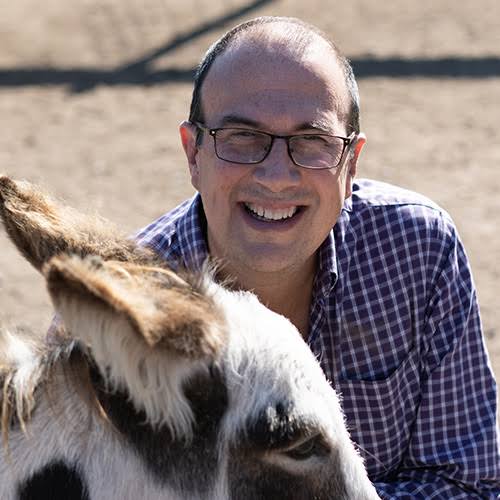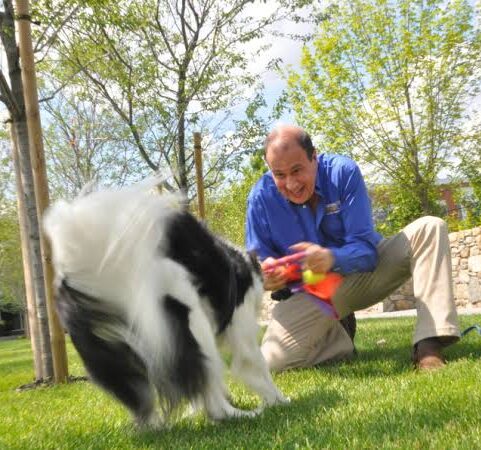We Do Animals has the immense pleasure of hosting the internationally renowned animal trainer Ken Ramirez.
If you are an animal trainer, a budding behaviourist or zookeeper we would love for you to spend 3 days with us learning from an industry leader.
November 27-29, 2025
Day 1 (Thursday 27 November)
Training 101: Core Tools and Practices for Advanced Trainers
Reinforcement Strategies
Day 2 (Friday 28 November)
Problem Solving
Handling Animal Mistakes Positively
Common Trainer Mistakes
Day 3 (Saturday 29 November)
Complex Tools
Quantity Recognition
Conservation Training


Training 101: Core Tools and Practices for Advanced Trainers
No matter how experienced a trainer may be, one must always go back to basics and remember some of the key aspects to successful training. This seminar is meant as a reminder to the experienced trainer about the many things that we often overlook or forget when training. Although appropriate for the beginner, Ken will look at each topic with a fresh perspective and a unique point of view with an eye toward helping those with experience think about these topics in a new way.
Reinforcement Strategies (Using Non-Food Reinforcers Effectively)
Reinforcement is the key to successful training, as most trainers already know! However, there are many different reinforcement strategies and reinforcement options available to trainers: consistent schedules, intermittent schedules, life rewards, toys, play, food, treats, etc. The mythology around how various schedules of reinforcement work can mislead trainers into using a strategy inappropriately and lead to frustration for the animal and the trainer. Many trainers fail to approach new reinforcement strategies systematically, which can be the reason why certain strategies seem to fail. This class will explore both the science behind these concepts and successful methods for implementing different types of reinforcement into a training program. We will also discuss techniques for evaluating whichever approach you choose.
Problem Solving
As a consultant, Ken is frequently called upon to resolve training challenges. These have ranged from problematic zoo animals to difficult working dogs to the more common pet challenges. In every case, he utilizes a problem-solving flow chart or matrix that guides him and his clients to an effective solution. He will share that process with participants and use one or two cases studies to demonstrate how to use the tool effectively.
Handling Animal Mistakes Positively
Your dog makes an error; he doesn’t do what you expected. How should you respond? Positive reinforcement trainers will go out of their way to avoid punishment. However, is a well-timed “no” still considered a punisher? How about a kindly trained “oops” to let the dog know he should change his behavior? What options are available to the well-intentioned positive reinforcement trainer? In this Session, Ken Ramirez will present the various techniques used to deal with incorrect responses and share the science and practical applications for each tool. These may include time outs, no reward markers (NRM), least reinforcing scenario (LRS), and redirection strategies (DRA, DRO, DRI). Ken will explore the varied applications of redirection and share his preferred approach to get an animal back on the desired path. Join Ken for this useful session about how to deal with mistakes or unwanted responses from your animal in an effective and positive manner.
Avoiding Common Trainer Errors and Traps
Training is easy! Very straightforward and easy to do – at least when reading about it in a book! After all, isn’t it as simple as “reinforce desired behavior and ignore unwanted behavior.”? If that’s true, why do so many trainers find themselves uncertain how to get out of a training hole or around a behavioral roadblock?
When teaching training skills, most instructors naturally focus on what to do, rarely on what not to do. Recipes tell you what ingredients to add not which ones to avoid. Driving directions focus on what route to take and where to turn, they seldom indicate “bad parts of town” or “dangerous roads or alleys.” However, wouldn’t we all benefit from knowing the risks, common errors, and frequent missteps of those who have made those mistakes? Ken has been there and made his fair share of mistakes and he’s eager to share them with you!
This seminar will focus on some of the most common mistakes and short-cuts trainers take and the reasons we are often tempted to go in the “wrong direction.” Nearly two dozen common mistakes and solutions will be discussed from “looking for the quick fix” to a problem to a trainer’s desire to ask for a behavior “just one more time” or “use a behavior before its training is complete.” Additionally Ken will examine some of the myths and other common beliefs or misunderstandings about training – exploring where those beliefs or sayings developed and how they can cause our training to get off track. Examples range from the overly used “you can’t teach an old dog new tricks” to the more serious belief that a “dog is just a domesticated wolf” or the simplified saying “the click ends the behavior.”
Ken will explore how often training gets messed up because of some seemingly simple missteps or a misunderstanding about an often-stated saying. The goal? Help attendees learn from the mistakes Ken himself has made as well as get his perspectives on why we are so tempted to go down that ill-fated road or believe that famous quote and help keep you from making these errors yourself.
Complex Tools
Social media discussions about positive reinforcement training are riddled with long discussions of particular operant methods that may or may not belong in your toolkit. Examples include the keep-going signal, differential reinforcement of incompatible or other behavior (DRI/DRO), jackpots, end of session signals, schedules of reinforcement and many others. Many of these tools are useful only in very specific circumstances such as highly advanced stimulus-control projects. Casual or incorrect use can be confusing to the learner or, worse, punishing. Ken Ramirez, will take away the mystery and confusion.
Quantity Recognition
For several decades, Ken has been sharing his approach to conceptual training with the world. These Sessions have helped attendees advance their training by approaching advanced concepts very systematically (modifier cues, adduction, matching to sample, mimicry, and many more!). But the Sessions have also led to some interesting research opportunities for Ken.
Most recently, Ken demonstrated how to teach dogs to count! But what started as a basic conceptual project continued to get bigger and more complicated. Various scientists convinced Ken to take the project further and turn it into real research. Ken was blessed to have an enthusiastic dog that seemed to enjoy the process of learning, so he continued the project to new levels. To the best of Ken’s knowledge, he has taken this project further than has been attempted with any dog previously. His research also revealed contradictions and controversy within the child cognitive psychological community. These developments prompted additional questions about what the new information might indicate about a seldom-studied cognitive ability in dogs.
In this Session, Ken will share the various phases of the project, including teaching the concept, the challenges of turning it into research, and how the project evolved over time. In addition, he will reveal some of the data from this project and discuss the implications as he compares that data with research performed with children.
Conservation Training
The science and application of learning theory is growing in use and popularity. From training the household pet to caring for the largest exotic animal in the zoo, applied behavior analysis has led to better behaved pets and improved animal care for animals all over the world. Creative trainers are always finding new ways to apply behavioral science; in the last several decades trainers have used advanced training skills to give back to nature and contribute to a wide range of conservation initiatives. Ken will share his training experiences with several unique conservation projects as well as those initiated by other skilled trainers. Conservation training is an exciting and expanding direction for experienced trainers to put their skills to use. Key applications include the expanded use of husbandry behaviors for conservation research, remote training projects, introduction of species to the wild, and other uses of behavior knowledge to aid in managing and studying animals to contribute to conservation. These applications have been used in assisting with conservation efforts with condors, wolves, sea otters, dolphins, sea lions, polar bears, sea turtles, chimpanzees, elephants and many others. The use of remote training in these projects has great possibilities for application in the pet training world.
We acknowledge the Traditional Owners and Custodians of the lands on which we work and pay our respects to Indigenous Elders past, present and emerging.
At We Do Animals, each of us contributes to inclusion—we all have a role to play. Our culture is the result of our behaviors, our personal commitment, our curiosity, how we collaborate, and the ways that we courageously share our perspectives and encourage others to do the same.

Website by First Draft Communications
Copyright © 2024. All rights reserved.